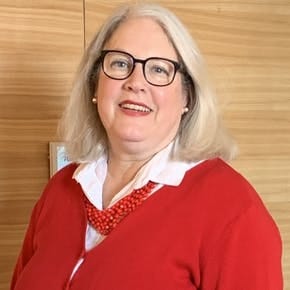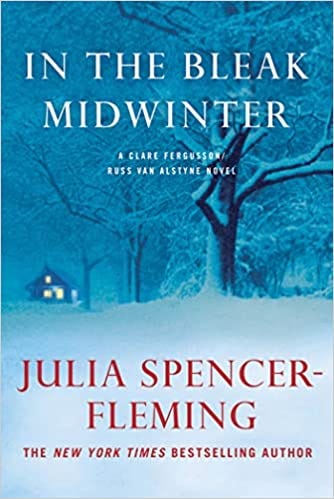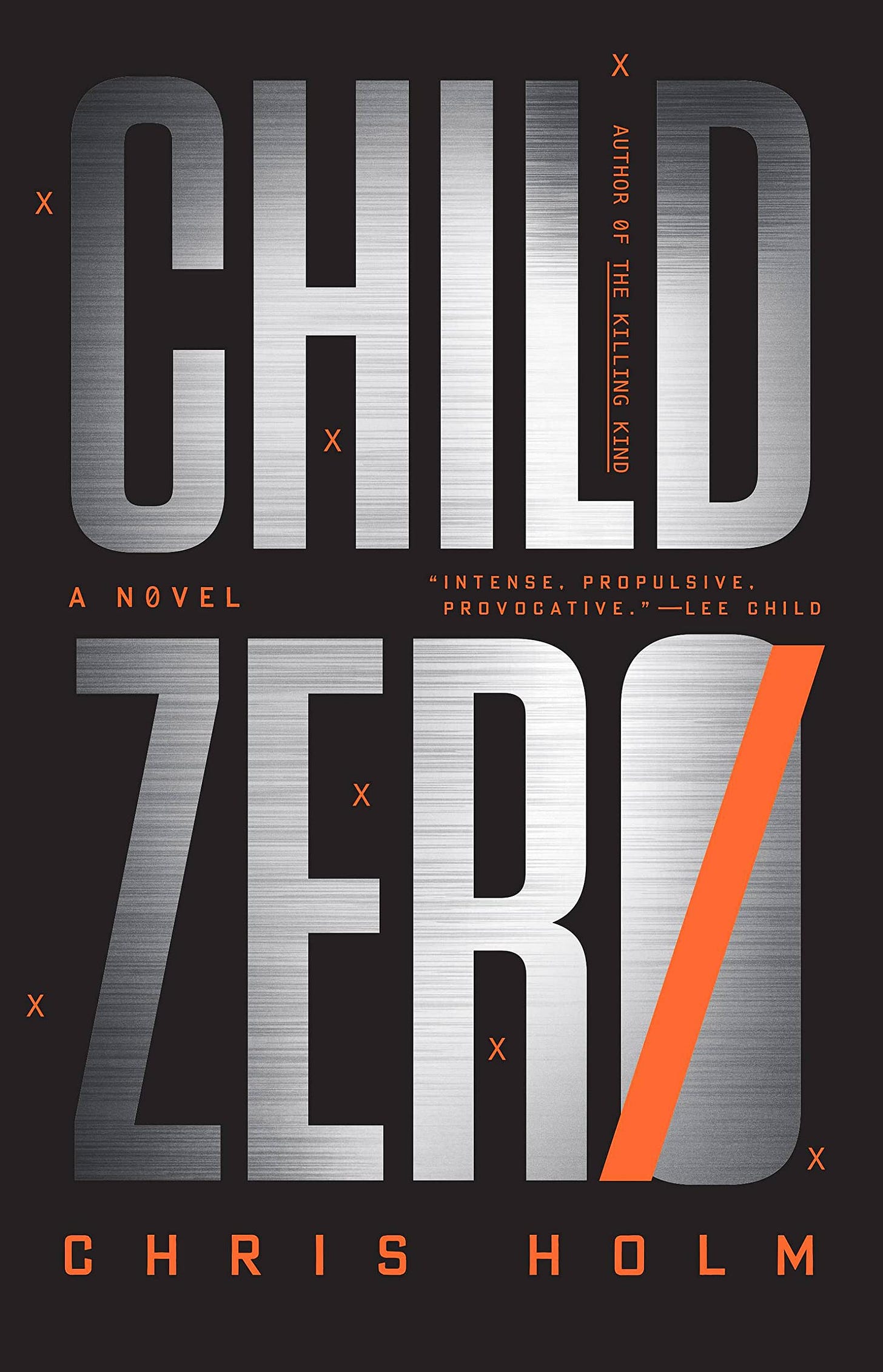Five Questions with Mystery Author Julia Spencer-Fleming
We talk about her characters, form and more
Julia Spencer Fleming wrote one of the best first sentences I’ve ever read: In the Bleak Midwinter opens with the line, “It was a hell of a night to throw away a baby.”
When I asked her about it at Malice Domestic, an annual mystery convention in April where she was the guest of honor, she broke into a huge smile and said, “Isn’t that awesome. It's the best first line I will ever write. I am never going to come close to that. Ever. It’s like Hamilton. I took my shot.”
That line launched Julia’s career when she won a publishing contract through a Malice Domestic contest in 2001. She’s now the author of nine books focused on Clare, an Army helicopter pilot turned Episcopal priest, and Russ, a police chief, in a small upstate New York town.
The brilliant writing, compelling characters, upstate New York setting and Clare and Russ’s will-they-won’t-they dynamic led me to devour the first eight books in the series in a month and then anxiously wait for the ninth book. It’s a perfect series for fans of Louise Penny’s Inspector Gamache books, offering mysteries and insights on religion, life, friendship and more.
Julia and I chatted about her career path, her characters and more. Our conversation has been edited and condensed for clarity.
What was your path to writing and publishing?
I’ve always been a passionate reader. As a kid, I would write these stories where something terrible would happen to a girl who was very much like me and people would feel very sorry. But it never occurred to me that there was a career in writing.
I had gone to law school and gotten admitted to the bar. About five minutes later, I got pregnant with my daughter and fifteen minutes after she was born, I got pregnant with my son. When they started school, I was at a loss of what to do. I asked my mom, my sister and two of my friends what I should do and each said I should be a writer.
I started writing science fiction and joined an online writers’ group for sci-fi. It became clear very early that I was good at it. I wrote 50,000 words of a novel and took it to a science fiction convention. There, the feedback I got was, your characters are well-rounded and realistic, your writing is a publishable quality and your ideas about science fiction are hackneyed and clichéd.
When I looked at it again, I realized I had written a murder mystery that was in a space station. So, I read as many award-winning mysteries as I could find and that was my writing course. Then I started writing what became my first book, In the Bleak Midwinter. I entered it into the St. Martins Malice Domestic contest because I thought it was a way to tell people I was working on getting my book published without actually having to do anything. And then it won, and I’ve been with them ever since. It’s a Cinderella story.
You’ve been writing these characters for a long time. What do they mean to you and how has writing them changed over the years?
Writing them has changed because I feel more confident about my own instincts and what I want to do with them than when I was writing my first book. Then, I felt like I couldn’t spend too much time not on the mystery. Now, I know what people are really looking for is to be with the characters. They want characters to care for and root for. The mystery is the engine that drives the plot, but that’s not what brings the reader in.
Writing the characters is like visiting old friends. Literally, I have characters that are people in my life. I wrote a small side character, the church secretary, named Lois, which was my mother’s name. My mom passed unexpectedly in 2018 and when I’m writing Lois, whose job is to be funny and hand Clare her messages, it’s like being with my mom a bit.
Why did you make your main character a minister?
I’ve not been a minister, but I'm a lifelong Episcopalian. What I discovered I was drawn to, when I was reading all those award-winning mysteries, were stories that were not about grabbing the bad guys, but stories about dealing with the aftermath of violence. Clare’s job, any religious job, is to help us take the broken pieces of the pot and put it together.
I also like amateur sleuths where it makes sense they’re involved in the mystery. We expect priests and rabbis to be there in a crisis. They know things that other people don't know. They're active in the community. There are all those entry points into the crime.
I deliberately conceived of Claire as someone who is a combination of impetuous and a planner, which is a quality I’ve seen in real-life pilots. They’ll spend an hour going over every inch of their aircraft and then they’ll do barrel rolls in the sky. So, Clare does stuff that is arguably stupid, but it’s backed into her personality. Her leaping before looking is thinking ‘I can fix this.’ It comes from her army past and her desire to help people.
Each of your books are mysteries but you experiment a lot with form, such as writing a book that takes place in a single 24-hour period. What draws you to that experiment?
I try to give myself a different challenge with every book, and a lot of it has to do with structure. To Darkness and to Death takes place in 24 hours. One Was a Soldier has an elaborate time structure where we go back and forth from the present and the past, until the past catches up with the present. The book after that was extremely focused and almost claustrophobic.
These structures let me stretch myself a little bit. At this point, I define myself as someone who's writing a novel with a mystery in it. Acknowledging that frees me up to not stick to a certain format or a certain way of telling the story.
Lastly, any books you want to recommend?
Chris Holm, a friend of mine, has a thriller called Child Zero. It’s near science fiction about a pandemic, but not our pandemic. It’s just a great thriller. It’s got characters you root for. It’s intellectually interesting and it’s a real step out for Chris.
I read it and then I went back and reread it because I finished it so fast.
Thanks to Julia for talking with me. You can purchase her books here and follow her on Facebook and Twitter.
And for Julia’s fans, please know she assured me that she’s working on the next book and that Kevin Flynn and Hadley Knox will have a happy ending (once she’s done torturing them).
What to Read If is a free weekly book recommendation newsletter. Need a rec? Want to gush about a book? Reply to this email, leave a comment or find me on Twitter @elizabethheld.
If you’re reading this on Substack or were forwarded this email, and you’d like to subscribe, click the button below.
Disclosure: I am an affiliate of Bookshop.org and I will earn a commission if you click through and make a purchase.







I need to start at the beginning with Julia. I read One Was a Soldier years ago without realizing it was part of a series — loved it, but for some reason never sought out the others. I am a huge mystery fan — it’s my comfort reading — so now I know I’m missing out. This interview is the kick in the pants that I needed!
I've been a fan forever--read the books, bought Kindles and re read, listened to the Audiobooks--
I love all of the different characters and love the moral lessons of these books-- JSF isn't afraid to push to the edge of the hard choices. Its great to know that there may be another book one of these days